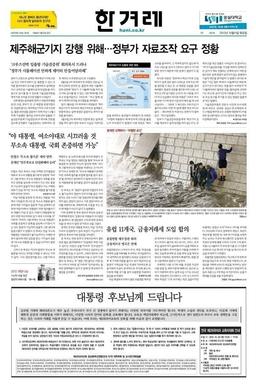
The Hankyoreh is a centre-left liberal daily newspaper in South Korea. It was established in 1988 after widespread purges forced out dissident journalists, and was envisioned as an alternative to existing newspapers, which were regarded as unduly influenced by the authoritarian government at the time. When it launched, it claimed to be "the first newspaper in the world truly independent of political power and large capital." As of 2016, it has been voted as the most trusted news organization by Korean journalists for nine consecutive years but also it is the least influential news outlet by the survey. It has online editions in English, Chinese, and Japanese.

Kim Tae-hee is a South Korean actress. Considered one of South Korea's most beautiful actresses, she is best known for her roles in Korean dramas such as Stairway to Heaven (2003), Love Story in Harvard (2004), Iris (2009), My Princess (2011), Yong-pal (2015), and Hi Bye, Mama! (2020). Kim Tae-hee is referred to as one of "The Troika" along with Song Hye-kyo and Jun Ji-hyun, collectively known by the acronym "Tae-Hye-Ji".

Shin Min-a is a South Korean model and actress best known for starring in television dramas A Love to Kill (2005), My Girlfriend Is a Nine-Tailed Fox (2010), Arang and the Magistrate (2012), Oh My Venus (2015), Tomorrow, With You (2017), Hometown Cha-Cha-Cha (2021), and Our Blues (2022).

Cha Seung-won is a South Korean actor, who began his career as an in-demand fashion model in the 1990s. Cha achieved stardom through the hit comedy films Kick the Moon (2001), Jail Breakers (2002), My Teacher, Mr. Kim (2003), and Ghost House (2004). After proving his versatility in other genres, notably in the period thriller Blood Rain (2005) and the melodrama My Son (2007), Cha's popularity continued with the television series Bodyguard (2003), City Hall (2009), The Greatest Love (2011), Hwayugi (2017), One Ordinary Day (2021), and Our Blues (2022).
Shin Eun-kyung is a South Korean actress. She is best known for her leading roles in Downfall (1997) and My Wife Is a Gangster (2001). Shin is most prominent Korean actress in the 1990s, alongside Shim Eun-ha, Go So-young and Jeon Do-yeon, whom she starred with on General Hospital.

Kim Ah-joong is a South Korean actress, model and singer. She is best known for playing the main character in the romantic comedy 200 Pounds Beauty.

Shin Se-kyung is a South Korean actress, singer and model. She started as a child actress and had her breakthrough in 2009 with the sitcom High Kick Through the Roof. Since then she starred in the films Hindsight (2011), R2B: Return to Base (2012) and Tazza: The Hidden Card (2014), as well as the television series Deep Rooted Tree (2011), The Girl Who Sees Smells (2015), Six Flying Dragons (2015–2016), The Bride of Habaek (2017), Black Knight: The Man Who Guards Me (2017–2018), Rookie Historian Goo Hae-Ryung (2019), and Run On (2020).

Kim Ji-soo is a South Korean actress.
Shin Jeong-ah is a South Korean woman who lied about her academic background to become an assistant art professor at Dongguk University and chief curator at Sungkok Art Museum. She created an international scandal shortly after her appointment in July 2007 as joint artistic director of the 2008 Gwangju Biennale, when she was found to have fabricated her academic credentials that she had graduated from the University of Kansas and Yale University. Shin was sentenced to 18 months in prison, and Dongguk University unsuccessfully sued Yale University in U.S. court for at least $50 million in damages.

The Kyunghyang Shinmun or Kyonghyang Sinmun is a major daily newspaper published in South Korea. It is based in Seoul. The name literally means Urbi et Orbi Daily News.

Lee Bo-young is a South Korean actress. She is best known for starring in the television dramas My Daughter Seo-young (2012), I Can Hear Your Voice (2013), Whisper (2017), Mother (2018), When My Love Blooms (2020), and Mine (2021). Lee was Gallup Korea's Television Actor of the Year in 2013.

Aram Hur is a South Korean teacher, practicing humanist, educator, publisher, lecturer, and social entrepreneur.

Jung Yu-mi is a South Korean actress. Jung made her feature film debut in Blossom Again (2005), for which she received acting recognition. She has since starred in the critically acclaimed films Family Ties (2006), Chaw (2009), My Dear Desperado (2010), and the box office hits The Crucible (2011), Train to Busan (2016) and Kim Ji-young: Born 1982 (2019). She also frequently appears in films by auteur Hong Sang-soo, notably Oki's Movie (2010) and Our Sunhi (2013). Jung has drawn praise for her unique screen presence and versatility.
NoCut News is a daily newspaper run by South Korea's Christian Broadcasting System (기독교방송). Since November 2003, they have had a partnership with Central and Local News Media Networks(Over 30) for sharing of articles and photo content. In March 2006, they began printing a separate edition for North America, in competition with the Christian Times.

Kim Je-dong is a South Korean comedian, variety and talk show host on television.

Lee Hwi-jae is a South Korean TV presenter, comedian, actor, and singer. Lee studied theater at the Seoul Institute of the Arts, then made his TV debut in 1992 as a comedian after working as a floor director for MBC's entertainment program Sunday, Sunday Night. He shot to stardom in the program Life Theater. Since then, he has expanded his career to hosting variety shows such as Sang Sang Plus, Sponge and Quiz to Change the World. He was the third highest-paid entertainer at MBC in 2008, earning ₩574.5 million.
The Baeksang Arts Award for Best Supporting Actor – Television is an award presented annually at the Baeksang Arts Awards ceremony organised by Ilgan Sports and JTBC Plus, affiliates of JoongAng Ilbo, usually in the second quarter of each year in Seoul.
1st Republic is a South Korean historical television series that was originally broadcast on MBC TV from 2 April 1981 to 11 February 1982. According to some sources, it is considered the first political drama television series in South Korean history, and the first to depict a recent president during an era of heavy media censorship. It covers the First Republic of Korea: the government of South Korea between 1948 and 1960. The series consisted of 39 episodes, each around an hour long, and led to multiple sequel series over the next few decades that covered each of the Five Republics of Korea, including the 2005 5th Republic TV series.













